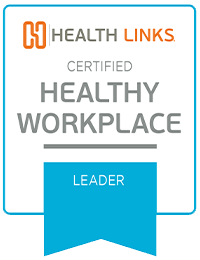
May is Mental Health Month. TIAA, a Fortune 100 company that is a leading provider of secure retirements and outcome-focused investment solutions, stands head and shoulders above others in how it supports workplace mental health. The organization won the 2022 Health Links® Mental Health Impact Award in recognition of its impressive approach to employee mental health. TIAA’s Living Well Program Director Emily Sharpe also won the Health Links Director’s Award that same year.
In the following Q&A, Sharpe explains how TIAA addresses employee mental health and the many supports the company has in place to put its people first. We encourage you to let her perspective and TIAA’s approach encourage you in your own workplace mental health efforts.
Our Living Well Program is always evolving and we're always trying to get better. That's what led me to Health Links because you don't just apply for an award. You get technical support to get better. We've worked with David Shapiro at Health Links to look at additional policies around time off, tobacco policies, and nursing mother accommodations.
Health Links has helped us document our policies. We found the Family Friendly Workplace module helpful and we're dipping our toes in the water with the Recovery Friendly Workplace module right now.
Definitely the advising sessions, the one-on-one consultation. Sometimes I have an idea, and I can run it by David or David has an idea to share. It may not be something that would work here, but we talk it through and maybe decide that while it may not work, something else along those lines may. That's what I find to be the most valuable aspect of working with Health Links.
The advising sessions with David help me to think of outside of the box. You build a relationship with this person and you get to know them as you're working, and they get to know your company. I find the sessions really valuable, and its far and beyond worth the money. To have an outsider looking in to give you that level of advice is really helpful. David shares practices from other organizations that we maybe hadn't thought about before.
We were talking about mental health for a long time, but the pandemic really opened up those lines of communication for us. For the first time, we had senior leaders sharing their own experience with mental health. We had employees more willing to talk about the struggles they've experienced or the struggles within their own families or friend groups. When they would come to us for resources, we were fortunate enough to have the budget to provide them, but then we were also able to explore what we could be doing better.
People were more comfortable talking about mental health and getting the treatment and care they need. At the same time, we also know that not everyone was going to go to a counselor.
We realized we could also have health coaching that focuses on depression and anxiety. We could train our onsite counselors to offer various mental health trainings like Mental Health First Aid®. We also just launched a new emotional intelligence program. We do a lot on the topic of resilience, and we also just started offering Youth Mental Health First Aid. It’s seeing the ongoing need and realizing that no matter what we offer, there's probably something else we can be doing.
I think you have to meet employees where they are. You might have a group of employees who are 100% comfortable talking about mental health and sharing their own experiences and aren't afraid to talk about going to counseling. Or you might have employees who are really afraid to have those types of conversations because there is still stigma around mental health. I think you have to meet them where they are and grow together, and make sure that whatever you're doing, you're doing it for them and not at them.
Anything is better than nothing as long as it has a good intention behind it, and no matter what someone's budget is, there are things they can do to help their employees thrive.
During COVID, when our senior leaders started to see the effects on employee mental health, it was a good reminder for them that they are leaders. If they expect people to take care of themselves, then they, as leaders also have to take care of themselves and be open about it. Because if they're not, everyone's going to assume that they're the leader and they've got it all figured out when that's not the case.
At some point, we are all going to have some sort of issue with mental health. If it's grief, stress, depression, anxiety, or something more major than that. I think that the pandemic was the first time we had gone through something that affected our mental health at the same time. It really opened up the doors to having more conversations about mental health at work.
The one that I'm most excited about is our Mental Health First Aid offered to any employee who wants to take it. It was an investment for us to have staff people trained to offer that, but we believe that the investment is well worth it and will support our people for years to come.
What I am probably proudest of are our onsite counselors, because they left community practices to come and work with our employees. We have dedicated counselors who see hundreds, if not, thousands of our employees throughout the year and I'm just always proud of the work they do.
When you look at the finalists for the director's award, I think it was probably a hard choice because it was between Nick Williams from Absolute Caulking & Waterproofing. When I did the Certificate in Total Worker Health® program with the School of Public Health, I did my project studying Nick’s company. The things that Nick is doing at Absolute are just incredible.
With the mental health award, I think it speaks to how we truly are a company that cares. When you offer as much as we're able to, or even a company like Nick's, it shows that you care about your people. For me as the Living Well Director, my big thing has always been about relationships. People aren't going to trust an app on their phones. They're not going to trust some random person who comes in and talks once a quarter. It was really important for me to develop relationships with employees. And obviously, I haven't met all 12,500 of them. But I know a lot of them, and I try my best to be honest and fair and consistent, and sometimes just a shoulder to cry on, or someone to talk to.
I think what has really led our program is the people behind it. It's not just a program. It's a group of people who really do care about employees. It's nice to be recognized. But it's even nicer to know that we're doing what's right for our people.
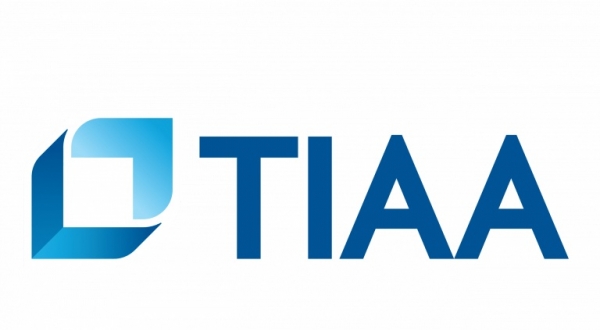
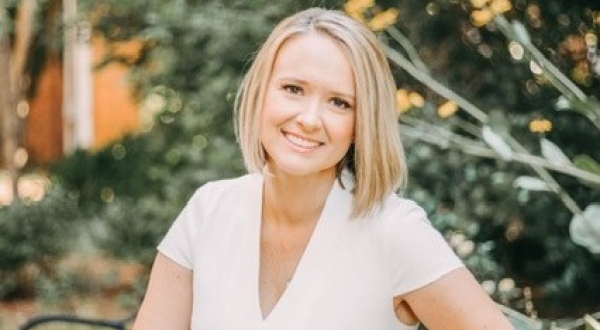
Emily Sharpe, Living Well Program Director
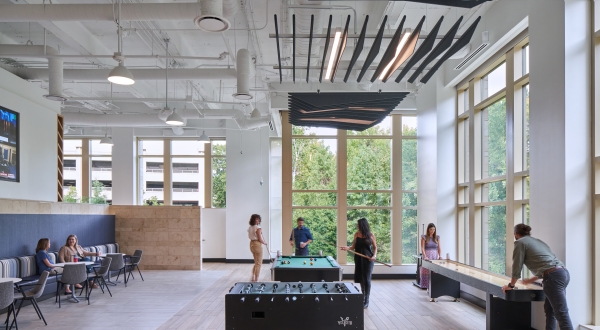
TIAA office game area: Bringing associates together for team building and fun
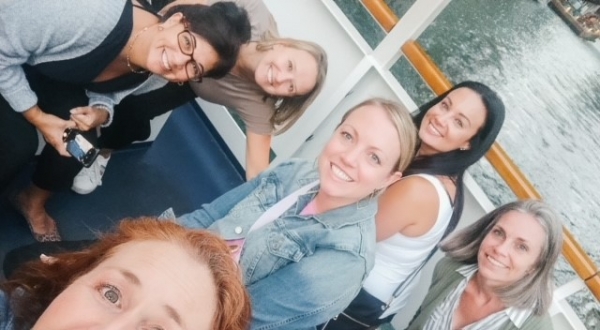
Living Well Program Team
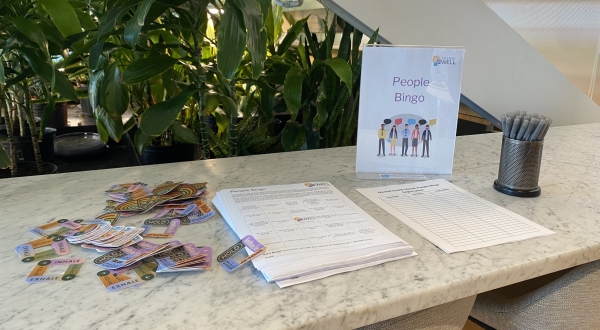
People Bingo game: part of TIAA's Mental Health Month programs. Designed to bring employees together
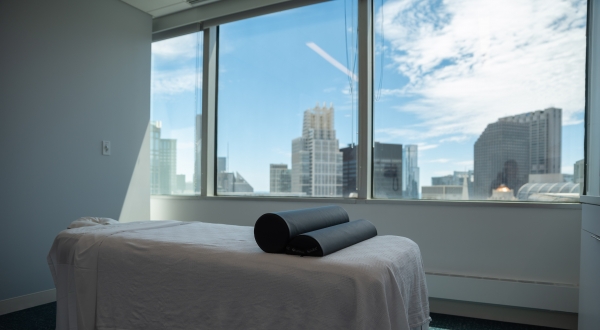
Massage room in Chicago office: Employees can access onsite massages at significantly reduced prices